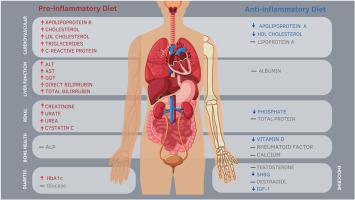当前位置:
X-MOL 学术
›
Nutr. Metab. Cardiovascular Dis.
›
论文详情
Our official English website, www.x-mol.net, welcomes your feedback! (Note: you will need to create a separate account there.)
Association of a dietary inflammatory index with cardiometabolic, endocrine, liver, renal and bones biomarkers: cross-sectional analysis of the UK Biobank study
Nutrition, Metabolism and Cardiovascular Diseases ( IF 3.9 ) Pub Date : 2024-03-14 , DOI: 10.1016/j.numecd.2024.03.010 Fernanda Carrasco-Marín , Longgang Zhao , James R. Hébert , Michael D. Wirth , Fanny Petermann-Rocha , Nathan Phillips , Fiona C. Malcomson , John C. Mathers , Lyn D. Ferguson , Frederik Ho , Jill Pell , Carlos Celis-Morales , Guillermo Molina-Recio , Rafael Molina-Luque
Nutrition, Metabolism and Cardiovascular Diseases ( IF 3.9 ) Pub Date : 2024-03-14 , DOI: 10.1016/j.numecd.2024.03.010 Fernanda Carrasco-Marín , Longgang Zhao , James R. Hébert , Michael D. Wirth , Fanny Petermann-Rocha , Nathan Phillips , Fiona C. Malcomson , John C. Mathers , Lyn D. Ferguson , Frederik Ho , Jill Pell , Carlos Celis-Morales , Guillermo Molina-Recio , Rafael Molina-Luque

|
Research into the relationship between an Energy-adjusted Diet-Inflammatory Index (E-DII) and a wider health-related biomarkers profile is limited. Much of the existing evidence centers on traditional metabolic biomarkers in populations with chronic diseases, with scarce data on healthy individuals. Thus, this study aims to investigate the association between an E-DII score and 30 biomarkers spanning metabolic health, endocrine, bone health, liver function, cardiovascular, and renal functions, in healthy individuals. 66,978 healthy UK Biobank participants, the overall mean age was 55.3 (7.9) years were included in this cross-sectional study. E-DII scores, based on 18 food parameters, were categorised as anti-inflammatory (E-DII < -1), neutral (−1 to 1), and pro-inflammatory (>1). Regression analyses, adjusted for confounding factors, were conducted to investigate the association of 30 biomarkers with E-DII. Compared to those with an anti-inflammatory diet, individuals with a pro-inflammatory diet had increased levels of 16 biomarkers, including six cardiometabolic, five liver, and four renal markers. The concentration difference ranged from 0.27 SD for creatinine to 0.03 SD for total cholesterol. Conversely, those on a pro-inflammatory diet had decreased concentrations in six biomarkers, including two for endocrine and cardiometabolic. The association range varied from −0.04 for IGF-1 to −0.23 for SHBG. This study highlighted that a pro-inflammatory diet was associated with an adverse profile of biomarkers linked to cardiometabolic health, endocrine, liver function, and renal health.
中文翻译:

饮食炎症指数与心脏代谢、内分泌、肝脏、肾脏和骨骼生物标志物的关联:英国生物银行研究的横断面分析
对能量调整饮食炎症指数 (E-DII) 与更广泛的健康相关生物标志物之间关系的研究有限。现有的大部分证据都集中在慢性病人群的传统代谢生物标志物上,而关于健康个体的数据很少。因此,本研究旨在调查健康个体中 E-DII 评分与涵盖代谢健康、内分泌、骨骼健康、肝功能、心血管和肾功能的 30 种生物标志物之间的关联。这项横断面研究纳入了 66,978 名健康的英国生物银行参与者,总体平均年龄为 55.3 (7.9) 岁。 E-DII 评分基于 18 项食物参数,分为抗炎 (E-DII < -1)、中性 (-1 至 1) 和促炎 (>1)。进行回归分析,调整混杂因素,以调查 30 种生物标志物与 E-DII 的关联。与接受抗炎饮食的人相比,接受促炎饮食的人 16 种生物标志物的水平有所增加,其中包括 6 种心脏代谢标志物、5 种肝脏标志物和 4 种肾脏标志物。浓度差异范围为肌酐 0.27 SD 到总胆固醇 0.03 SD。相反,那些采用促炎饮食的人六种生物标志物的浓度降低,其中包括两种内分泌和心脏代谢标志物。关联范围从 IGF-1 的 -0.04 到 SHBG 的 -0.23 不等。这项研究强调,促炎饮食与心脏代谢健康、内分泌、肝功能和肾脏健康相关的生物标志物的不良状况有关。
更新日期:2024-03-14
中文翻译:

饮食炎症指数与心脏代谢、内分泌、肝脏、肾脏和骨骼生物标志物的关联:英国生物银行研究的横断面分析
对能量调整饮食炎症指数 (E-DII) 与更广泛的健康相关生物标志物之间关系的研究有限。现有的大部分证据都集中在慢性病人群的传统代谢生物标志物上,而关于健康个体的数据很少。因此,本研究旨在调查健康个体中 E-DII 评分与涵盖代谢健康、内分泌、骨骼健康、肝功能、心血管和肾功能的 30 种生物标志物之间的关联。这项横断面研究纳入了 66,978 名健康的英国生物银行参与者,总体平均年龄为 55.3 (7.9) 岁。 E-DII 评分基于 18 项食物参数,分为抗炎 (E-DII < -1)、中性 (-1 至 1) 和促炎 (>1)。进行回归分析,调整混杂因素,以调查 30 种生物标志物与 E-DII 的关联。与接受抗炎饮食的人相比,接受促炎饮食的人 16 种生物标志物的水平有所增加,其中包括 6 种心脏代谢标志物、5 种肝脏标志物和 4 种肾脏标志物。浓度差异范围为肌酐 0.27 SD 到总胆固醇 0.03 SD。相反,那些采用促炎饮食的人六种生物标志物的浓度降低,其中包括两种内分泌和心脏代谢标志物。关联范围从 IGF-1 的 -0.04 到 SHBG 的 -0.23 不等。这项研究强调,促炎饮食与心脏代谢健康、内分泌、肝功能和肾脏健康相关的生物标志物的不良状况有关。



























 京公网安备 11010802027423号
京公网安备 11010802027423号